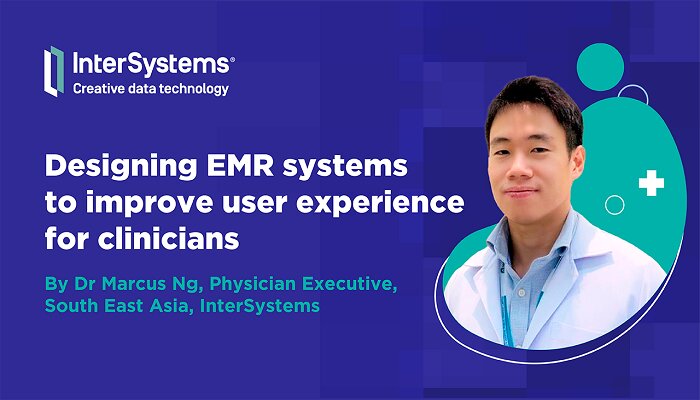Imagine, like me, that you were a clinician starting their medical career with the UK National Health Service (NHS). You discover a valuable resource that provides instant access to a patient’s medical history and insights into previous diagnoses and treatments – the electronic medical record (EMR) system.
Moreover, the information you enter into the EMR system is immediately available to other clinical team members, dramatically simplifying recordkeeping and clinical governance.
I could go on about the benefits for clinicians. But there is also a downside – getting the hang of EMRs can be like learning a new language. It takes time, and no matter how good you get, it still feels like, well, a foreign language.
Why? Because most EMR interfaces are built around data, not people. As a result, clinicians can get distracted navigating menus and trying to find the right screens and fields instead of engaging with the patient in front of them.
Simplifying EMR workflows and increasing user satisfaction
But what if the EMR was designed around the person using the system, not the data? InterSystems has done that with TrakCare Assistant, an interactive navigation tool for the InterSystems TrakCare® EMR system.
TrakCare Assistant fundamentally transforms how you interact with an EMR system, providing instant and effortless access to the information you need. Think of it as your co-pilot. Just type in what you are looking for, and TrakCare Assistant will automatically take you to the right EMR screen or function without distractions. You simply enter text strings or fragments into the TrakCare Assistant box, and TrakCare Assistant does the rest.
TrakCare Assistant reimagines the user experience, dramatically streamlining EMR interactions in a straightforward yet highly effective way. Clinicians spend less time clicking through the EMR interface, and more time focusing on what matters most – the patient. TrakCare Assistant puts the clinician front and centre, reducing learning curves and improving user productivity and satisfaction.
TrakCare Assistant includes open APIs that make it easy to tie in external applications and add enhanced capabilities like speech recognition and voice typing. You can also use the APIs to incorporate AI engines to deliver advanced functionality.
Interaction time with the EMR reduced by up to 66%
Internal tests by InterSystems clinicians determined that TrakCare Assistant substantially reduced the time to access information and perform tasks, compared to navigation with traditional menus and search bars. For typical physician workflows, the new Assistant reduces interaction time with the EMR by up to 66% – time that can be given back to patient interactions.
TrakCare Assistant not only streamlines the interaction with the EMR, but it also learns user patterns over time. Given how often some tasks are repeated in settings such as critical care units, this new, more personalised workflow is ground-breaking. The potential cumulative time saving is substantial, as is the improvement in user experience and satisfaction. There is also a direct benefit to the patients, since the time clinicians spend on manual tasks for accessing patient information prolongs the time to care delivery.
Innovation needed to reduce clinician burnout
The bottom line is that TrakCare Assistant simplifies EMR workflows and reduces friction, helping clinicians minimise clicks, increase efficiency and maintain focus. This means doctors and nurses can spend less time navigating the EMR and more time engaging patients.
That is important because clinician turnover and frustration are higher than ever. According to a recent KLAS research report, 60% of clinicians feel completely burned out. In the future, we think hospitals and healthcare systems must continue to adopt innovations like TrakCare Assistant that not only improve efficiency but also make life easier for clinicians and reduce burnout.
We will be discussing innovations including AI, FHIR and Connected Care and the latest EMR trends like TrakCare Assistant at the InterSystems Asia Healthcare Summit on 21-22 August in Jakarta. For more information, see: https://iscasiasummit2024.splashthat.com/.




















